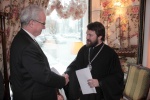Metropolitan Hilarion chairs final session of theological talks with representatives of the Evangelical Church in Germany
On 11 December 2012, Metropolitan Hilarion of Volokolamsk, chairman of the Moscow Patriarchate’s Department for External Church Relations (DECR), chaired the final session of bilateral theological talks between the Russian Orthodox Church and the Evangelical Church in Germany on the topic “Christian Churches in a Multicultural Society.”
Metropolitan Hilarion opened the session, expressed his profound satisfaction with the re-opening of theological dialogue in a new format and presented prospects of the development of inter-Church relations. The DECR chairman stated that all participants in the dialogue should be responsible not only to their Churches, but also to their partners in inter-Christian dialogue. Theological talks should not turn into academic debates of experts, but should produce results in inter-Christian relations.
Addressing representatives of the Evangelical Church in Germany, the DECR chairman said: ‘I hope that back at home you will speak about our discussions and will take our position into account when you will take decisions on ethical problems, on which Christians of different confessions do not agree today…
“You know that the Russian Orthodox Church is open to dialogue, which we highly appreciate and want to develop. I hope that no events in your Church will make our dialogue impossible, as was the case with certain Protestant communities, which went too far in the liberalization of their church order and moral teaching… I would like to ask you to listen to us and make our opinion known to the leadership of your church and your church public and remember of our common responsibility for faithfulness to the Tradition, which goes back to Christ and the apostles and to which we all belong.”
Metropolitan Hilarion hopes that the celebration of the 500th anniversary of the Reformation will give the leadership of the Evangelical Churches in Europe another opportunity to look at the founders of Protestantism, who did not want to liberalize the Church, but wished to make it more strict and faithful to the apostolic tradition.
Bishop Martin Schindehutte appreciated the importance of theological talks and inter-Church cooperation for contemporary Christianity.
























